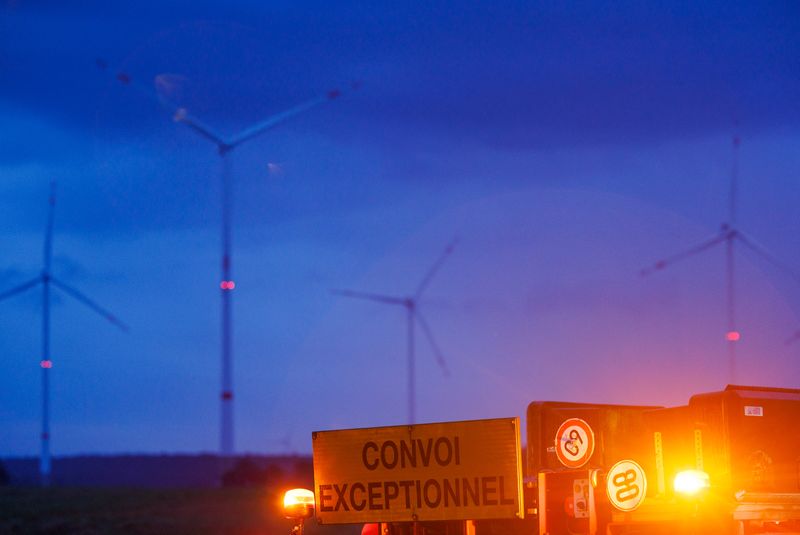By Riham Alkousaa
BERLIN (Reuters) - Germany's wind power expansion is facing an unexpected roadblock: builders need permits to transport the heavy turbines down the country's roads, and they are waiting months to get them.
With a backlog of more than 15,000 applications for approvals, companies say their projects are heavily delayed, with the costs of prolonged warehousing for steel tower segments, generators and blades running into the millions.
"Assuming nothing changes, it could cost 115 million euros extra by the end of the year," Felix Rehwald, a spokesperson for wind turbine manufacturer Enercon, told Reuters.
Transport permits are needed to drive heavy loads over bridges and highways. Sometimes structures and road signs need dismantling, and police escorts are needed for some loads, while others can only be sent at night.
"It is currently one of the most pressing challenges for us and our competitors," Rehwald added.
Delays in securing permits were costing the company thousands of euros per day, Rehwald said, adding that bottlenecks could only get tighter as wind construction ramps up towards the middle of next year.
Germany aims to obtain 80% of its electricity from renewable sources by 2030, 115 gigawatts of which should come from onshore wind, but a lack of transport permits endanger that goal.
Nordex, a global leader in wind turbine manufacturing, told Reuters that parking spots for its lorries are too scarce and that the cost of permits has risen as much as tenfold, with a spokesperson talking of "massive delays and significant costs."
The cost of applications had jumped to more than 1,000 euros per permit in 2021 from 100 euros, Nordex said. But permits were so rigid in their scope that companies often made multiple applications to cover for different eventualities.
"I can't apply for a transport permit and tomorrow say: 'I'll drive the green truck instead of the red', because a new permit is needed," Kai Westphal, a regional head of transport at Wind turbine maker Vestas, told Reuters.
Some 150 permits are needed on average for transporting a wind turbine, 100 to 120 for cranes, and 60 for turbine components, a study by engineering association VDMA published last year showed.
Without a single law regulating heavy load transport, each federal state requires different documents, the study added.
Documents are submitted using software that dates from 2007 and according to general guidelines that date back to 1992 but each authority has its own administrative regulations for permit applications, VDMA researcher Sebastian Steul said.
"We need a geo-information system as soon as possible that combines the handling of all processes related to large and heavy transport that can be used by both the industry and the authorities," Steul said.
The steep rise in the number of applications resulting from the wind power ramp-up is contributing to delays, as is the poor condition of some bridges and roads and different interpretations of the regulations by authorities, he said.
A 2021 restructuring of the authority that examines the applications has complicated the problem, companies said, blaming untrained and unresponsive staff and a new software tool the government-owned Autobahn GmbH company uses for examining applications.
Autobahn GmbH said approvals were the responsibility of federal states and it only provided an expert opinion on navigability of a requested route.
The government-owned company said it was doing everything to speed up the process but examining the transport of wind turbines' rotor blades was particularly demanding due to their extraordinary length. A nationwide, standardized and largely automated process should be in place by the end of 2023, it said.
Germany's government on Wednesday announced plans for a raft of measures designed to stimulate the economy by reducing bureaucracy, speeding up approval processes for new construction and digitizing citizens' access to key government services.
The so-called Germany Pact sets out a range of goals to be achieved in consultation with powerful regional governments including swifter, online consultation processes for wind farms and transport and data networks, a government document showed.
In the meantime, processing each permit will take up to three months in Germany, compared with an average of two to three weeks in the Netherlands and around 10 days in Denmark.
Having specially trained drivers and pilots for the entire fleet of such big deliveries has accelerated the process in Denmark as authorities don't require a police escort for each transfer any more, said Morten Arnskov Boejesen, a senior advisor for Confederation of Danish Industry.

The Danish Road Directorate took over this responsibility from the police in Oct. 2021 and both the industry and the authority seem to be pleased with how the process is being handled, said to Soren Andersen, Area manager in The Danish Road Directorate.
"It's definitely easier in Denmark; you get an application through in a week … we can only dream of this here," Westphal added.